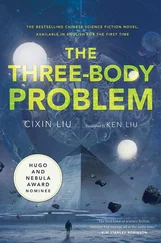The man walked gingerly through the living room door, but did not dare venture further. He seemed afraid of marking the carpet with the dirty soles of his shoes. He took off his hat and looked at the master of the house through his thick glasses as he bowed repeatedly. Tyler made up his mind to send him off as soon as he spoke his first sentence, for even if what the man had to say was important to him, to Tyler it was meaningless.
In a frail voice, the pitiful man uttered his first sentence. It struck Tyler like a bolt of lightning and so dazed him that he practically sat down on the ground. Every word was like a thunderclap.
“Wallfacer Frederick Tyler, I am your Wallbreaker.”
* * *
“Who would have thought we’d one day be facing a battle map like this,” Chang Weisi exclaimed as he looked at a one-to-one-trillion-scale chart of the Solar System displayed on a monitor large enough to be a movie screen. It was almost entirely dark, except for the tiny spot of yellow in the center that was the sun. The chart radius reached the middle of the Kuiper Belt. When it was displayed in its entirety, it was like looking down on the Solar System from a distance of fifty AU above the ecliptic plane. The chart accurately marked the orbits of planets and satellites, as well as the conditions of known asteroids, and it could display a precise sectional layout of the Solar System for any point in the next millennium. Now that positional markings for celestial bodies had been turned off, the chart display was bright enough that you could make out Jupiter if you looked closely enough. It was just an indistinct, tiny bright spot, but from this distance the other seven major planets were invisible.
“Yes, we are facing major changes,” Zhang Beihai said. The military had just completed a meeting to assess its first space map, and now only the two of them remained in the spacious war room.
“Commander, I wonder if you noticed the eyes of our comrades when they saw this map,” he said.
“Of course I noticed. It’s understandable. They would have imagined a space map to be like what you find in popular science books. A couple of colored billiard balls rotating around a fireball. It’s only when they’re faced with one drawn to an accurate scale that they come to an appreciation of the vastness of the Solar System. And, whether they’re air force or navy, the furthest their air and water craft can go doesn’t even amount to one pixel on the big screen.”
“It seems that looking at the battlefield of the future did not inspire a stitch of confidence or passion for battle in our comrades.”
“And now we’re back to defeatism.”
“Commander, I don’t want to talk about the reality of defeatism today. That’s a subject for a formal meeting. What I’d like to discuss is… well…” He faltered, and smiled, a rare thing for someone who was usually so outspoken.
Chang Weisi turned away from the map and smiled back at him. “Seems you’ve got something highly unorthodox to say.”
“Yes. Or something unprecedented, at least. I’m making a recommendation.”
“Proceed. Get right down to the topic. Of course, you don’t need encouragement for that.”
“Yes, Commander. Over the past five years, little progress has been made in basic planetary defense and space travel research. The preliminary technology in those two programs—controlled nuclear fusion and the space elevator—are still at square one, with no hope in sight, and there are all kinds of problems with higher-thrust chemical rockets. If things continue in this vein, then I fear a space fleet, even at the low-tech level, will remain science fiction forever.”
“You chose high-tech, Comrade Beihai. You ought to be well aware of the rules of scientific research.”
“Of course I’m aware of them. Research is a process of leaping forward, and qualitative change is only produced by long-term quantitative accumulation. Breakthroughs in theory and technology are mostly achieved in concentrated bursts…. Still, Commander, how many people understand the problem like I do? It’s very likely that in ten or twenty or fifty years, or even a century, we still won’t have any major breakthroughs in any scientific or technical field, and at that point, how far will defeatist thinking have developed? What spiritual and mental state will have taken hold in the space force? Commander, am I really taking this too far?”
“Beihai, what I most admire about you is that you always keep the long term in mind as you work. It’s a rare thing among political cadres in this military. Please go on.”
“Well, I can only speak from the scope of my own work. Working under the above assumptions, what sort of difficulties and pressures will be faced by our future comrades engaged in political and ideological work in the space force?”
“A grimmer question is, how many ideologically qualified political cadres will be left in the forces?” added Chang Weisi. “To contain defeatism, we first need to have a firm faith in victory ourselves. But this is certain to be more difficult in your hypothetical future.”
“That’s where my worry lies, Commander. When that time comes, political work in the space force won’t be up to the task.”
“Your recommendation?”
“Send reinforcements!”
Chang Weisi looked at Zhang Beihai for a few seconds, then turned back to the big screen. He moved the cursor and enlarged the sun until their epaulets reflected the sunlight.
“Commander, what I mean is…”
He raised a hand. “I know what you mean.” Then he pulled back until the entire map was displayed, plunging the war room back into gloom, and then brought the sun forward again… and again and again as he thought, until at last he said, “Has it ever occurred to you that if political and ideological work in the space force is a complex and difficult task right now, it will considerably weaken today’s work to hibernate the most outstanding political officers and send them to the future?”
“I realize that, Commander. I’m just voicing a personal suggestion. Big-picture thinking is, of course, up to my superiors.”
Chang Weisi stood up and turned on the lights, illuminating the war room. “No, Comrade Beihai, this is a job for you now. Drop everything else. Starting tomorrow, you will focus on the Space Force Political Department, do some research into the other branches, and draft a preliminary report for the Central Military Commission as soon as possible.”
* * *
The sun was setting behind the mountains when Tyler arrived. Exiting the car, he faced a vision of paradise: the softest light of the day shining on the snow peaks, the lake, and the forest, and Luo Ji and his family enjoying the otherworldly evening in the grass on the lakeshore. What first caught his eye was the mother, so young-looking, like an older sister to the one-year-old child. From a distance it was hard to make her out, but as he drew closer, his attention shifted to the child. If he hadn’t seen it with his own eyes, he wouldn’t have believed that such an adorable little being actually existed. Like a stem cell of beauty, the embryonic state of all that is beautiful. Mother and child were drawing on a large sheet of white paper as Luo Ji stood off to one side watching with interest as he had in the Louvre, gazing from a distance at his beloved, now a mother. Moving closer still, Tyler saw in his eyes an infinite bliss, a happiness that seemed to permeate everything between mountain and lake in this Garden of Eden….
Having just arrived from the grim outside world made the scene before his eyes feel unreal. He had been married twice but was now single, and the joys of family had meant little to him in his pursuit of a man’s glory. Now, for the first time ever, he felt he had lived an empty life.
Читать дальше












